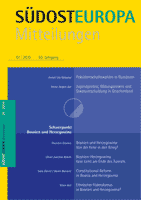Mythos und Realität eines ethnischen Föderalismus in Bosnien und Herzegowina
Myth and Reality of Ethnic Federalism in Bosnia and Herzegovina
Author(s): Sören KeilSubject(s): Politics / Political Sciences
Published by: Südosteuropa Gesellschaft e.V.
Summary/Abstract: Generally, federalism in Bosnia and Herzegovina is regarded as a mechanism of inter-ethnic power-sharing. It ensures autonomy for the Bosnian Serbs in the Republika Srpska and territorial autonomy for the Bosnian Croats in three of the ten cantons of the Federation of Bosnia and Herzegovina. Scholars of Bosnia have often blamed the flawed Dayton Constitution for the problems of political deadlock and structural deficits of Bosnia since 1995. While, however, the General Framework Agreement for Peace in Bosnia and Herzegovina (GFAP) created a highly decentralized federal state, it did not create a pure ethnic federation, in which all political conflict is reduced to inter-ethnic bargaining. Instead, the GFAP created a mixture of ethnic and territorial federalism. However, it is still the practice of the Bosnian parties that reduces “Dayton-Bosnia” to inter-ethnic power-sharing and all political conflict to a conflict between the different Bosnian peoples. It is also in this context that the international peace and state builders failed in Bosnia, since they did not manage to encourage the development of a party system that offered alternatives to ethnically homogenous parties. This needs to be a key lesson learnt also for international efforts of state-building in Kosovo and elsewhere.
Journal: Südosteuropa Mitteilungen
- Issue Year: 2010
- Issue No: 01
- Page Range: 76-86
- Page Count: 11
- Language: German
- Content File-PDF

